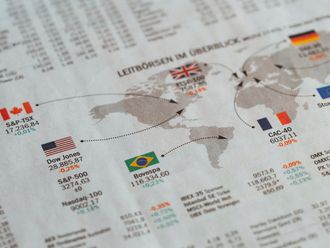
Dubai: In light of the pandemic’s impact on investments, particularly in 2020, UAE banks and brokerages have been receiving numerous queries from their customers on what hypothetical market-moving events can investors brace for this year, in order to be better protected from potential losses or flux.
Although such events are highly unlikely, given that the COVID-19 health crisis was also a highly unlikely event, those with money invested in the market are tweaking their investments to be better hedged against any such events.
Switzerland-based Julius Baer has been receiving such queries and the private bank's head of research Christian Gattiker and strategy research analyst (emerging markets) Mathieu Racheter, details out what quantifies as ‘black swan’ or rather low-probability, high-impact events in 2021 and identifies eight such possible events.
Will 2021 disappoint?
The first surprise market investors can largely brace for is one that of disappointment, with “2021 turning out to be a normal, boring year, defying high-flying expectations and disappointing overall”, noted Gattiker and Racheter in a research note, which summarised an extensive analysis.
Currently, analysts are widely of the opinion that COVID-19 vaccine prospects are making 2021 a year where global economies recover, and while stock markets worldwide have already priced in a lot of the good news, more gains seem possible as corporate profits rebound and central banks keep rates steady.
The second – albeit highly unlikely – potential market-moving surprise events this year is if a third coronavirus wave emerges and causes renewed restrictions before vaccinations are rolled out completely, Julius Baer analysis shows, while adding that the third possible black-swan event is if the US dollar drops by more than 20 per cent and enters a bear (declining) market.
Rebound of globalisation in 2021
The fourth prediction of a possible black-swan depends how globalisation rebounds in 2021, so another event Gattiker and Racheter thinks would qualify this year is this:
“Globalisation rebounds in a 2009-style manner, with a rebound of global trade volumes and more, not less, exchange of information technology in the wake of the COVID-19 crisis,” Julius Baer analysis further noted.
Globalisation survived a scare after the virus virtually froze trade and exposed countries' overreliance on China. But international commerce has rallied since and is expected to thrive amid an obsession with low costs.
The coronavirus disrupted global supply chains, shuttering factories, emptying shelves in supermarkets and leaving countries clamoring for essential medical supplies. The crisis exposed the overreliance of companies and governments on China-dominated global value and supply chains, even when it came to essentials such as medicines.
Although many predicted a permanent retreat for globalisation, predicting companies would move back production to their destination markets, months later, there are hardly any signs of so-called reshoring. On the contrary, global trade is witnessing a spectacular rebound, led by China, experiencing massive demand for its protective gear and work-from-home tech products.
Will bond markets crash in 2021?
The other unlikely events Julius Baer evaluates investors can brace for are, bond markets crashing and bond yields spiking, and another possible surprise being – crises in emerging markets flaring up due to renewed capital outflows.
Bond yield is the return an investor realises on a bond. Most bonds have an interest rate that determines their coupon payments, but the true cost of borrowing or investing in bonds is determined by their current yields. A bond's yield is the discount rate that can be used to make the present value of all of a bond's cash flows equal to its price.
What can happen to stock markets in 2021?
Julius Baer’s Gattiker and Racheter views another possible surprise being a ‘melt-up’ of equity markets, like before the historic 1987 crash.
In a "market meltdown", major global stock market indexes (such as the Dow Jones and Nasdaq in US) may fall anywhere from 10-50 per cent. A ‘melt-up’ is the exact opposite – a ‘melt up’ occurs when the markets suddenly explode higher.
A ‘melt-up’ might be triggered by decreasing interest rates, strong earnings reports from prominent companies and economic recovery. In a market ‘melt-down’, investors look for any reason to sell, with the attitude being "sell first, think later".
In a market ‘melt-up’, investors are buying first and thinking later. Market melt ups can result in increases of anywhere from 20 to 100 per cent-plus for the major global market indexes.
Will Big Tech break up in 2021?
Another – albeit unlikely – event investors can brace for this year, according to Julius Baer’s Gattiker and Racheter, is that technological conglomerates that dominate the world’s IT industry break up for regulatory reasons.
The calls to break up Big Tech are getting louder – claiming companies like Amazon, Facebook, and Google have too much power over the global economy.
The US government is upping its scrutiny of Big Tech, which is facing sweeping antitrust investigations by the US Department of Justice.
New laws could be coming too, with a bill dubbed the Monopolization Deterrence Act introduced, which would impose harsher penalties on Big Tech companies that engage in anticompetitive practices.
What should investors do to hedge against such market surprises?
“There is not one panacea that can be put in place to work against all of the surprises in the list above at the same time,” noted Julius Baer’s Gattiker and Racheter.
“Therefore, we suggest individual hedging strategies for investors that could perhaps relieve some of the most detrimental outcomes of the risks highlighted above.”
Here’s what Julius Baer’s Gattiker and Racheter recommend investors to protect their investments against each surprise:
If stock markets disappoint investors in terms of gains, Julius Baer recommends implementing a hedging strategy of staying put or trading heavily.
“Either you accept the low volatility environment and respond by minimising transaction costs, or you use the minimal shifts by being more active than ever to capture any divergences in the short run,” Gattiker and Racheter further noted.
The analysts further added that you build up safe-haven assets like gold, hard currencies, and assets denominated in currencies with limited US dollar exposure such as European or domestic Asian assets.
Against a possible Big Tech break-up, another hedging strategy that is recommended by Julius Baer is this: “Buy brick-and-mortar businesses in the run-up to the event, thereafter buy the runners-up across the world, and then buy the broken-up parts,” Gattiker and Racheter further noted, while adding that this proved to be highly rewarding after the telecommunications and oil industries were broken up.








